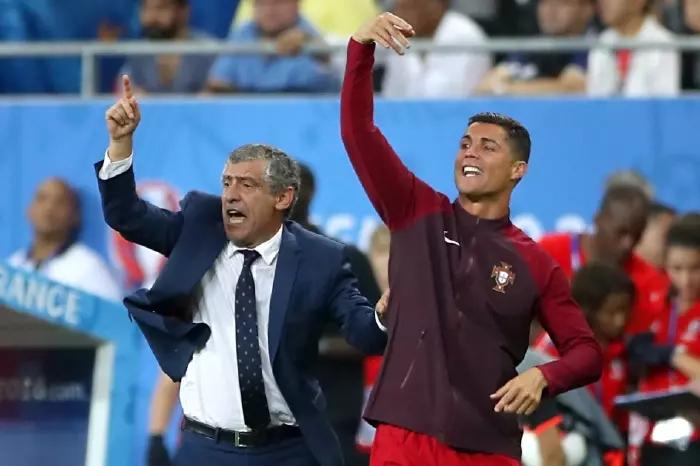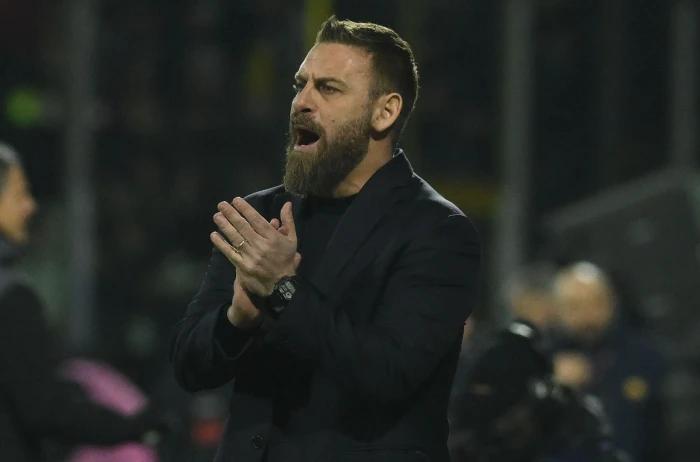Ronaldo to replace Solskjaer? The records of these six former stars suggests it's a bad idea

As Cristiano Ronaldo continues to be linked with the manager's role at Manchester United manager, we take a look at six managerial appointments that ended in tears for former superstars.
After Manchester United's 5-0 humiliation at the hands of Liverpool, manager Ole Gunnar Solskjaer finds himself under immense pressure, and it only seems a matter of time until he's shown the door.
As the Red Devils ponder Solskjaer's replacement, Cristiano Ronaldo's name refuses to leave the headlines - shock - but could the 36-year-old really take charge at Old Trafford?
Well, it wouldn't be the first time United have put one of their players in charge, with Ryan Giggs taking interim charge in 2014 following the dismissal of David Moyes.
Already a master of coaching from the sidelines, should Ronaldo follow his former team-mate into management, it would prove a fitting next chapter to his Manchester United story.
However, those championing CR7 for the role would do well to remember that world-class players don't necessarily make world-class bosses. And, as these six former stars-turned-managers illustrate, sometimes they struggle to make even average ones.
Gary Neville
Neville has been a supporter of Solskjaer despite his rotten form, and while many suggest it's a result of their playing days, it could well be down to his own experience in the hotseat.
After 19 years as a player, and four years as assistant at England, Neville decided to try his luck in management in 2015 when he took charge of Valencia alongside his brother Phil.
The duo lasted just four months.
With no prior experience and unable to speak Spanish, Neville's time in Valencia was nothing short of catastrophic. With Valencia 14th in La Liga and out of the Europa League, a 7-0 loss to Barcelona proved to be the final nail in the coffin.
Sir Bobby Charlton
Charlton's legendary playing days saw him win a World Cup with England and have a stand named in his honour at Old Trafford.
As a player-coach, Charlton was nearing the end of his playing career, but found himself having to contribute frequently as Preston slid down Division Two.
Preston had only narrowly surivived the drop the previous campaign and Charlton's arrival did little to inspire the side. They were relegated to the third tier at the close of the 1973/74 season.
Charlton remained in charge for the following campaign, but suffered a backlash from supporters over the sale of John Bird to Newcastle. Preston eventually finished ninth and Charlton resigned shortly after.
Edgar Davids
Davids enjoyed a hugely successful yet bizarre career as a soccer player. He was a world-class midfielder who thrived at Ajax, Juventus and Barcelona, yet failed at Barnet.
Alongside Mark Robson, Davids joined as a player-manager in the hope of steering the League Two side away from relegation.
However, Barnet's results fell away and they ended up being relegated on the final day of the 2012/13 season.
Davids continued in sole charge the following season, and decided to wear the No. 1 shirt in an attempt to "make it a trend for midfielders". The beginning of the end.
Unaware player-managers are required to set a good example on the pitch, Davids received four yellow cards and three reds in just nine appearances for Barnet.
To add to his controversial on-pitch image, Davids decided to 'opt out' of going to away games that required an overnight stay, instead letting his assistant manager, Ulrich Landvreugd, take charge.
He eventually resigned from his role in January 2014. Recent stints in the Netherlands with Telstar and at Portuguese side Olhanense have proved just as dismal, with the Olhanense chairman describing Davids' appointment as "catastrophic".
Paul Gascoigne
Despite his brilliant career at Tottenham and Newcastle, even Gascoigne's biggest fans will tell you that he was amazing on the pitch, and less so off it.
The same can be said for his managerial ability. Gascoigne hung up his boots in 2004 and was named coach of League Two side Boston United.
Clearly confident of transferring his playing ability to the dugout, Gascoigne stated he "can become a great coach and a great manager".
However, after just three months, Gascoigne resigned and instead took charge of non-league side Kettering Town.
As a sign of his commitment, Gascoigne suggested he would invest enough money to own a third of the club. However, it never came to fruition.
That's likely because the England star only lasted 39 days before being sacked. Poor results on the pitch certainly didn't help his cause, but Kettering owner, Imraan Ladak, also cited Gascoigne's drinking problems as a reason behind his departure.
Diego Maradona
Maradona is another player with staggering ability who often struggled with off-field vices.
Brief stints at Argentine sides Deportivo Mandiyu and Racing Club failed to suggest Maradona would be cut out for management. Nevertheless, he was still made head coach of Argentina in 2008.
After a poor start to 2010 World Cup qualification, two consecutive wins helped Maradona's side qualify. However, his celebrations - which involved shouting abuse at journalists in a press conference - landed him in trouble with FIFA.
Maradona received a two-month ban and was back for his side's World Cup campaign in the summer. Three wins in the group stage, against Nigeria, South Korea and Greece, saw them advance to the round of 16, and a subsequent 3-1 victory over Mexico progressed them to the quarter-finals.
Despite being ranked fifth in the world at the time, Argentina were routed 4-0 by Germany and Maradona immediately suggested he might leave.
He decided to stay but it was all over when the Argentinian FA decided against renewing his contract, leaving Maradona feeling "betrayed" and "lied to".
Sir Bobby Moore
A World Cup winner, a West Ham legend, and named by Pele as the greatest defender to ever grace the game - there's no denying the outstanding playing career of Sir Bobby Moore.
After his departure, Southend managed to win promotion the following year. Whether Moore was to blame for their failings, or should be credited for building solid foundations is up for debate.
However, the fact that he never got another role in management probably answers the question.







